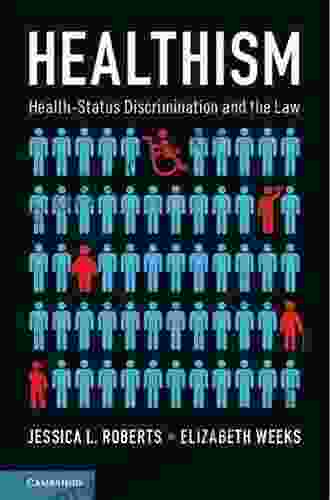"Healthism": Health Status Discrimination and the Law - A Comprehensive Guide

In a society that often equates physical and mental well-being with personal worth and social status, individuals living with health conditions face a unique and pervasive form of discrimination known as "healthism." This article aims to provide a comprehensive overview of healthism, exploring its legal implications, historical context, and societal impact. By shedding light on the discrimination faced by individuals with health conditions, this article seeks to raise awareness and advocate for equal treatment and justice.
4.2 out of 5
| Language | : | English |
| File size | : | 1325 KB |
| Text-to-Speech | : | Enabled |
| Screen Reader | : | Supported |
| Enhanced typesetting | : | Enabled |
| Word Wise | : | Enabled |
| Print length | : | 222 pages |
Defining Healthism
Healthism can be defined as the assumption that individuals in good health are morally, socially, and economically superior to those with chronic illnesses or disabilities. It is a form of prejudice and discrimination based on health status that manifests in various forms, including:
* Negative attitudes and stereotypes towards individuals with health conditions * Denial of employment, housing, or educational opportunities * Limited access to healthcare and other essential services * Social isolation and exclusion * Internalized shame and self-stigma
Historical Context of Healthism
The origins of healthism can be traced back to the 19th century eugenics movement, which advocated for the sterilization and segregation of individuals deemed genetically inferior, including those with disabilities and chronic illnesses. These ideas gained traction in the early 20th century, leading to discriminatory policies and practices that stigmatized and marginalized people with health conditions.
In the United States, the legacy of healthism shaped the development of the healthcare system, which has historically favored the healthy and wealthy while leaving behind those with chronic illnesses and disabilities. Discriminatory practices such as denial of insurance coverage, unequal access to medical treatments, and institutionalization in mental hospitals contributed to the systemic oppression of individuals with health conditions.
Legal Protection Against Health Status Discrimination
In response to the growing recognition of health status discrimination, several legal frameworks have been established at both the federal and state levels to protect individuals with health conditions. Key laws include:
* The Americans with Disabilities Act (ADA): Prohibits discrimination against individuals with disabilities, including those related to health status. * The Genetic Information Nondiscrimination Act (GINA): Protects individuals from discrimination in employment and health insurance coverage based on genetic information, including predispositions to certain health conditions. * The Health Insurance Portability and Accountability Act (HIPAA): Protects the privacy and confidentiality of health information, preventing its discriminatory use.
Despite these laws, health status discrimination persists in various forms. Limited enforcement, lack of awareness about legal rights, and societal stigma continue to create barriers for individuals with health conditions seeking equal treatment and opportunities.
Societal Impact of Healthism
Healthism has profound societal consequences, impacting not only individuals with health conditions but also their families, communities, and the overall social fabric. Discrimination and stigma associated with health conditions can lead to:
* Lowered self-esteem and mental health challenges * Unemployment and financial instability * Limited social participation and isolation * Reduced access to education and employment opportunities * Increased healthcare costs and healthcare disparities
Moreover, healthism contributes to a culture of fear and shame, discouraging individuals from seeking healthcare or disclosing their health status, which can have detrimental health outcomes and perpetuate health inequalities.
Addressing Healthism: A Call for Change
Overcoming healthism requires a comprehensive approach involving legal, societal, and cultural changes. Key strategies include:
* Education and awareness: Raising awareness about healthism and its harmful effects is crucial to challenge stigma and promote understanding. * Enforcement of anti-discrimination laws: Strengthening enforcement of existing laws and enacting new legislation to provide greater protection against health status discrimination is essential. * Inclusive healthcare policies: Ensuring equal access to healthcare, insurance coverage, and medical treatments for all individuals, regardless of their health status, is fundamental. * Challenge societal stereotypes: Countering negative attitudes and stereotypes towards individuals with health conditions through media representation, public campaigns, and educational programs is vital. * Promote social inclusion: Creating inclusive environments in schools, workplaces, and communities where individuals with health conditions feel valued and respected is crucial.
"Healthism" is a pervasive and harmful form of discrimination that has profound consequences for individuals with health conditions and society as a whole. Understanding its historical roots, legal implications, and societal impact is essential for developing effective strategies to address and overcome this injustice. By promoting awareness, strengthening legal protections, and challenging societal stereotypes, we can create a more just and inclusive society where individuals with health conditions are treated with dignity, respect, and equal opportunities.
4.2 out of 5
| Language | : | English |
| File size | : | 1325 KB |
| Text-to-Speech | : | Enabled |
| Screen Reader | : | Supported |
| Enhanced typesetting | : | Enabled |
| Word Wise | : | Enabled |
| Print length | : | 222 pages |
Do you want to contribute by writing guest posts on this blog?
Please contact us and send us a resume of previous articles that you have written.
 Book
Book Novel
Novel Page
Page Chapter
Chapter Text
Text Story
Story Genre
Genre Reader
Reader Library
Library Paperback
Paperback E-book
E-book Magazine
Magazine Newspaper
Newspaper Paragraph
Paragraph Sentence
Sentence Bookmark
Bookmark Shelf
Shelf Glossary
Glossary Bibliography
Bibliography Foreword
Foreword Preface
Preface Synopsis
Synopsis Annotation
Annotation Footnote
Footnote Manuscript
Manuscript Scroll
Scroll Codex
Codex Tome
Tome Bestseller
Bestseller Classics
Classics Library card
Library card Narrative
Narrative Biography
Biography Autobiography
Autobiography Memoir
Memoir Reference
Reference Encyclopedia
Encyclopedia Benjamin Wiker
Benjamin Wiker Garry Apgar
Garry Apgar David Shalleck
David Shalleck Blythe Ayne Ph D
Blythe Ayne Ph D Bill Sherwonit
Bill Sherwonit Christina Kamp
Christina Kamp Laura Bellamy
Laura Bellamy Bill Schneider
Bill Schneider Ben Green
Ben Green Bernard A Chavis
Bernard A Chavis Isaac Daly
Isaac Daly Bob Holtzman
Bob Holtzman Dianne Stewart
Dianne Stewart Beth Newell
Beth Newell Caitlin Rother
Caitlin Rother Bob Brier
Bob Brier Bertus Engelbrecht
Bertus Engelbrecht Kareem Rosser
Kareem Rosser Ben Coes
Ben Coes Belle Payton
Belle Payton
Light bulbAdvertise smarter! Our strategic ad space ensures maximum exposure. Reserve your spot today!

 Gerald BellThe Island Thriller: A Dewey Andreas Novel That Will Keep You on the Edge of...
Gerald BellThe Island Thriller: A Dewey Andreas Novel That Will Keep You on the Edge of... Damon HayesFollow ·11.9k
Damon HayesFollow ·11.9k Fred FosterFollow ·17.7k
Fred FosterFollow ·17.7k Ernest HemingwayFollow ·15k
Ernest HemingwayFollow ·15k Howard PowellFollow ·11.8k
Howard PowellFollow ·11.8k Matt ReedFollow ·6k
Matt ReedFollow ·6k Xavier BellFollow ·4.2k
Xavier BellFollow ·4.2k Glen PowellFollow ·12.5k
Glen PowellFollow ·12.5k Eugene PowellFollow ·14.3k
Eugene PowellFollow ·14.3k

 Ivan Cox
Ivan CoxSpeak With Ease: The Ultimate Guide to Public Speaking...
By Rupika Raj ...

 Jesus Mitchell
Jesus MitchellVulcan Forge: A Suspense Thriller that Will Keep You on...
Vulcan Forge is...

 Dashawn Hayes
Dashawn HayesThe Carteret Family Bob Martin: A Comprehensive Review
Bob Martin's...

 Owen Simmons
Owen SimmonsUnlock the World of Cultural Nuances with "The Global...
Embark on a Journey of...

 Ian McEwan
Ian McEwanConquer the Mountain: True Account of Catastrophe and...
In the heart of California's stunning...
4.2 out of 5
| Language | : | English |
| File size | : | 1325 KB |
| Text-to-Speech | : | Enabled |
| Screen Reader | : | Supported |
| Enhanced typesetting | : | Enabled |
| Word Wise | : | Enabled |
| Print length | : | 222 pages |












